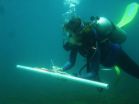(Press-News.org) Healthy reefs with more corals and fish generate predictably greater levels of noise, according to researchers working in Panama. This has important implications for understanding the behaviour of young fish, and provides an exciting new approach for monitoring environmental health by listening to reefs.
Contrary to Jacques Cousteau's 'Silent World', coral reefs are surprisingly noisy places, with fish and invertebrates producing clicks and grunts which combine to produce cacophonies of noise. Each reef is subtly different depending on the size and composition of the resident community.
By analysing recordings of coral reefs from the Las Perlas Archipelago in Pacific Panama (Central America), marine biologists have found that some reefs are noisier than others, and these differences in noise provide useful information about the state of the reef. Exeter University PhD student Emma Kennedy and her supervisor Dr Steve Simpson, working with an acoustician Dr Marc Holderied, also from the University of Bristol's School of Biological Sciences, found that healthier reefs were louder, with a clear association between overall noise level generated and the amount of living coral.
A more detailed investigation of the sound produced by some of the reefs showed that lower frequency sounds provided more information on the numbers of fish living on the reef, while the intensity of higher frequency reef sounds gave an indication of coral diversity. This is the first time that a link has been made between noise generated by individual reefs and the specific habitats and communities making up that reef.
Previous work by Dr Steve Simpson has shown that larval fish and corals returning to reefs after spending their first few weeks out in the plankton, search for habitat by listening out for, and moving towards, reef noise. Sound travels well underwater, meaning that noise produced by a reef can propagate several kilometres out to sea.
Dr Simpson said: "This study provides evidence that reef generated sound contains a real richness of information. This would provide fish and invertebrates with the cues they need to assess the quality of potential settlement sites before they can see them, a bit like wandering around a music festival eavesdropping on different bands before choosing where to pitch your tent. It may even provide the information that enables some fish to return to the very reef on which they were originally spawned."
The study also highlights the potential for using audio recordings to monitor the health of reefs. Usually, scientific assessment of reef health requires teams of scuba divers and huge quantities of equipment and so is costly, time consuming and difficult in remote areas. In this study, scientists dropped a cable off the side of the boat with a hydrophone (underwater recording device) attached. A two-minute recording contained enough information to distinguish between reefs. This is a very encouraging find for the development of acoustic recordings as ecological survey or monitoring tools.
The team are hoping that their findings will prompt other scientists to investigate reef sound further.
Emma Kennedy said: "Investigation of the acoustic properties of reefs is a relatively new area of science but already we're realising that there's more to underwater noises than just whale and dolphin communication! Reefs may be broadcasting a lot of information out into the sea that both humans and marine animals could use. We're hoping that our findings will encourage more research into this area, and are excited this might lead to the development of new tools for assessing reef health."
INFORMATION:
The research was a collaborative effort carried out from the Smithsonian Tropical Research Centre with Dr Hector Guzman (STRI) and Professor Hamish Mair at Heriot-Watt University in Edinburgh.
The research is published in the Journal of Experimental Marine Biology and Ecology, and was funded by Natural Environment Research Council (NERC, UK) grants to Steve Simpson and Emma Kennedy.
Taking the pulse of coral reefs
2010-09-20
ELSE PRESS RELEASES FROM THIS DATE:
Earth's highest coastal mountain on the move
2010-09-20
The rocks of Colombia's Sierra Nevada de Santa Marta—the highest coastal mountain on Earth—tell a fascinating tale: The mountain collides and then separates from former super-continents. Volcanoes are born and die. The mountain travels from Peru to northern Colombia and finally rotates in a clockwise direction to open up an entirely new geological basin. Smithsonian scientists were part of a four-year project to study Santa Marta's geological evolution. Their findings are published in the October 2010 special issue of the Journal of South American Earth Sciences.
The study ...
Returning troops face both physical and mental challenges
2010-09-20
Is the US health system comprehensively meeting the needs of returning veterans? With the recent attention to mental illness in returning soldiers, and post-traumatic stress disorder (PTSD) in particular, little research has focused on the medical care needs of those returning from Operation Enduring Freedom/Operation Iraqi Freedom, according to Dr. Susan Frayne, from the VA Palo Alto Health Care System and Stanford University, and colleagues.
Their research highlights that veterans suffering from PTSD also suffer more medical illnesses than do those with no mental health ...
Cholesterol drug may have role in treating prostate cancer
2010-09-20
TORONTO, Ont., Sept. 20, 2010 – A drug commonly prescribed for people with high cholesterol may also be effective in treating prostate cancer, according to new research by Dr. Xiao-Yan Wen at St. Michael's Hospital.
Rosuvastatin—a statin drug sold as Crestor—suppressed the growth of transplanted human prostate cancer cells in mice.
"Our data provided solid pre-clinical evidence and a strong rationale for clinical trials of statins in the treatment of prostate cancer," said Wen, whose research appears in the September issue of European Urology, the journal of the European ...
Study: Privacy key obstacle to adopting electronic health records
2010-09-20
The United States could achieve significant health care savings if it achieved widespread adoption of electronic health records (EHRs), but insufficient privacy protections are hindering public acceptance of the EHR concept, according to a new paper from researchers from North Carolina State University. The paper outlines steps that could be taken to boost privacy and promote the use of EHRs.
"Electronic health records could reduce costs in the U.S. by an estimated $80 to 100 billion each year," says Dr. David Baumer, head of the business management department at NC State ...
Kids and diabetes risk: Do chromosomes hold new clues?
2010-09-20
Children who have a high risk of developing type 2 diabetes might be identified earlier by way of tell-tale genetic indicators known as biomarkers. Some of those new biomarkers might be pinpointed in research led by Nancy F. Butte and funded by the U.S. Department of Agriculture (USDA) and the U.S. Department of Health and Human Service's National Institutes of Health.
Butte is with the USDA Agricultural Research Service (ARS) Children's Nutrition Research Center at Baylor College of Medicine in Houston, Texas, where she is a professor of pediatrics. ARS is USDA's principal ...
Plague researchers race to beat bioterrorists
2010-09-20
Saranac Lake, N.Y. – Given the many pressing concerns of the day, fear of plague probably isn't what causes most Americans to lose sleep. But for those whose responsibility it is to combat bioterrorism, plague is among the highest priorities. Those charged with that mission include scientists like medical researcher Steve Smiley, whose lab at the Trudeau Institute is working to develop a vaccine that will protect the public against weaponized forms of plague. The Institute, which is dedicated to studying how the immune system responds to infectious diseases, is at the forefront ...
No pain in the hospital -- wishful thinking or reality?
2010-09-20
More than 80% of hospitalized patients suffer more severe pain than necessary. This is the conclusion of Christoph Maier (Bochum University Hospital, Bochum, Germany) and his coauthors in their interim report of the Pain-Free Hospital Project ("Schmerzfreies Krankenhaus"), which appears in the current issue of Deutsches Ärzteblatt International (Dtsch Arztebl Int 2010; 107[36]: 607-14). The project, which was initiated in 2003, has the goal of improving pain management in hospitals across Germany.
To study the quality of pain therapy, the authors evaluated anonymous ...
Fidgety children are on the rise
2010-09-20
Hyperkinetic disorders among children and adolescents are becoming increasingly common. In the current issue of Deutsches Ärzteblatt International, Ingrid Schubert of the PMV Research Group at the University of Cologne and her colleagues address the question how this has affected the frequency of prescriptions for methylphenidate, a stimulant drug that is used to treat such disorders (Dtsch Arztebl Int 2010; 107[36]: 615¬21). The authors analyzed data concerning tens of thousands of persons insured by the AOK health insurance company in the German state of Hesse over the ...
Effects of chemoradiation therapy by using capecitabine on gastric cancer patients
2010-09-20
Gastric cancer is a major cause of cancer deaths in the world. The outcome of large gastric tumors and those with lymph node involvement remains poor after surgical resection. The optimal adjuvant therapy after surgical resection remains to be determined. The most common strategies in the adjuvant treatment of gastric cancers include fluoropyrimidine-based chemotherapy with or without radiation. The introduction of capecitabine has largely replaced continuous-infusion 5-fluorouracil (5-FU) owing to its ease of administration. However, its efficacy is not proven in randomized ...
How to control massive bleeding from the hepatic artery
2010-09-20
Delayed hepatic arterial hemorrhage after pancreaticoduodenectomy (PD) is not a common but a fatal complication, occurring in 7% of all patients. Its ideal management remains unclear and controversial.
A research article published on August 7, 2010 in the World Journal of Gastroenterology addresses this question. The authors reported the clinical outcome of 9 patients with life-threatening hemorrhage from a ruptured hepatic artery pseudoaneurysm after PD after treatment with a new interventional technique, namely placement of stent-grafts. This technique provides a good ...


